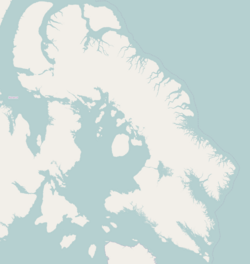Tanfield Valley, also referred to as Nanook, is an archaeological site located on Imiligaarjuit (formerly |Cape Tanfield), along the southernmost part of the Meta Incognita Peninsula of Baffin Island in the Canadian territory of Nunavut. It is possible that during the Pre-Columbian era the site was known to Norse explorers from Greenland and Iceland. It may be in the region of Helluland,[1] spoken of in the Vinland sagas (Saga of the Greenlanders and Saga of Erik the Red).[2][3]
| Location | Imiligaarjuit, Qikiqtaaluk Region, Nunavut, Canada |
|---|---|
| Coordinates | 62°39′14″N 69°34′11″W / 62.65389°N 69.56972°W |
| Site notes | |
| Archaeologists | Moreau Maxwell, Patricia Sutherland |
The Helluland Archaeology Project was a research initiative that was set up at the Canadian Museum of Civilization, now the Canadian Museum of History, to investigate the possibility of an extended Norse presence on Baffin Island with trading with the indigenous Dorset people.[4] It is now on hiatus following Patricia Sutherland's ouster from the museum in 2012.[5] Excavations led by Sutherland at Tanfield Valley found possible evidence[6] of medieval Norse textiles, metallurgy and other items of European-related technologies. Wooden artifacts from Dorset sites include specimens which bear a close resemblance to Norse artifacts from Greenland. Pelts from Eurasian rats have also been discovered.[7][8]
However, the eight sod buildings and artifacts found in the 1960s at L'Anse aux Meadows, located on the northern tip of Newfoundland, remains the only confirmed Norse site in North America outside of those found in Greenland.
Moreau Maxwell (1918–1998), professor and curator of Anthropology at Michigan State University, had previously researched the site in his study of the prehistory of Baffin island, the findings of which were summarized in his publication Prehistory of the Eastern Arctic (1985).[9]
References
edit- ^ "The Saga of Erik the Red". The Icelandic Saga Database. Sveinbjörn Þórðarson. Retrieved 12 January 2019.
This land they gave name to, and called it Helluland (stone-land).
- ^ Pringle, Heather (November 2012). "Vikings and Native Americans". National Geographic. 221 (11). Archived from the original on October 22, 2012. Retrieved January 28, 2013.
- ^ "World of the West Norse: Greenland to Baffin". Cornell University Library. December 8, 2015. Retrieved January 20, 2016.
- ^ "Helluland Archaeology Project". Canadian Museum of History. Retrieved October 18, 2015.
- ^ Stueck, Wendy; Taylor, Kate (4 December 2014). "Canadian Museum of History reveals researcher was fired for harassment". The Globe and Mail. Retrieved 3 January 2019.
On the program, host Carol Off interviewed Dr. Sutherland […] Off asked Dr. Sutherland whether she might have been fired from the Canadian Museum of Civilization (which was renamed the Canadian Museum of History last year) because her research was out of step with government views of Canadian history. Sutherland agreed […]
- ^ Barber, Elizabeth Wayland (1992) Prehistoric Textiles: The Development of Cloth in the Neolithic and Bronze Ages with Special Reference to the Aegean, Princeton University Press, "We now have at least two pieces of evidence that this important principle of twisting for strength dates to the Palaeolithic. In 1953, the Abbé Glory was investigating floor deposits in a steep corridor of the famed Lascaux caves in southern France […] a long piece of Palaeolithic cord […] neatly twisted in the S direction […] from three Z-plied strands […]" ISBN 0-691-00224-X
- ^ Pringle, Heather (October 19, 2012). "Evidence of Viking Outpost Found in Canada". National Geographic News. National Geographic Society. Archived from the original on October 21, 2012. Retrieved January 28, 2013.
- ^ Margo Pfeiff (July 29, 2013). "When the Vikings were in Nunavut". Up Here. Archived from the original on April 18, 2016. Retrieved April 6, 2016.
- ^ William A. Lovis (March 1998). "Moreau Sanford Maxwell". Society for American Archaeology Bulletin. 16 (2).
Further reading
edit- Maxwell, Moreau (1985) Prehistory of the Eastern Arctic (Academic Press) ISBN 978-0124812703
- Sutherland, Patricia (2015) The Helluland Archaeological Project (archive.org)
